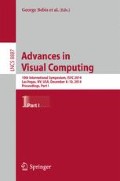Abstract
Though numerous image quality measures have been proposed, the search for a reliable IQM is still vigorously pursued by different research groups around the world. There is a need to compare the already proposed IQMs with respect to their adherence to human image quality perception. A model that can accurately simulate the human perception of image quality is a challenging task due to limited human knowledge in the related domains of psychology, vision, biology etc. The psycho-visual experiments remain the most accurate way to model human perception of visual quality. In this paper, different state of the art full-reference objective image quality metrics (IQMs) are evaluated against human subjective judgments on standard LIVE image quality database. The difference mean opinion scores (DMOS) were calculated from 17400 human judgments on 348 images distorted with white noise, Gaussian blur and Rayleigh fast-fading distortions. Subsequently, 13 leading IQMs like SSIM, VIF, FSIM, etc. were compared with DMOS on the basis of Pearson correlation coefficient. It is observed that though there is not a single winner, VIF and IFC seem to have a higher performance compared to other quality metrics.
Access this chapter
Tax calculation will be finalised at checkout
Purchases are for personal use only
Preview
Unable to display preview. Download preview PDF.
References
Wang, Z., Bovik, A.C.: Modern image quality assessment. Synthesis Lectures on Image, Video, and Multimedia Processing 2, 1–156 (2006)
Pedersen, M., Hardeberg, J.Y.: Full-reference image quality metrics: Classification and evaluation. Foundations and Trends® in Computer Graphics and Vision 7, 1–80 (2012)
Bovik, A.C.: Automatic prediction of perceptual image and video quality (2013)
Wajid, R., Bin Mansoor, A., Pedersen, M.: A study of human perception similarity for image quality assessment. In: Colour and Visual Computing Symposium (CVCS), pp. 1–6. IEEE (2013)
Sheikh, H.R., Wang, Z., Cormack, L., Bovik, A.C.: Live image quality assessment database release 2 (2005)
Ponomarenko, N., Battisti, F., Egiazarian, K., Astola, J., Lukin, V.: Metrics performance comparison for color image database. In: Fourth International Workshop on Video Processing and Quality Metrics for Consumer Electronics, vol. 27 (2009)
Zhang, L., Zhang, D., Mou, X.: Fsim: a feature similarity index for image quality assessment. IEEE Transactions on Image Processing 20, 2378–2386 (2011)
Recommendation, ITURBT: 500-11, Methodology for the Subjective Assessment of the Quality of Television Pictures, Recommendation ITU-R BT. 500-11. ITU Telecom. Standardization Sector of ITU (2002)
Sheikh, H.R., Sabir, M.F., Bovik, A.C.: A statistical evaluation of recent full reference image quality assessment algorithms. IEEE Transactions on Image Processing 15, 3440–3451 (2006)
Huynh-Thu, Q., Ghanbari, M.: Scope of validity of psnr in image/video quality assessment. Electronics Letters 44, 800–801 (2008)
Wang, Z., Bovik, A.C., Sheikh, H.R., Simoncelli, E.P.: Image quality assessment: from error visibility to structural similarity. IEEE Transactions on Image Processing 13, 600–612 (2004)
Wang, Z., Simoncelli, E.P., Bovik, A.C.: Multiscale structural similarity for image quality assessment. In: Conference Record of the Thirty-Seventh Asilomar Conference on Signals, Systems and Computers, vol. 2, pp. 1398–1402. IEEE (2003)
Sheikh, H.R., Bovik, A.C., De Veciana, G.: An information fidelity criterion for image quality assessment using natural scene statistics. IEEE Transactions on Image Processing 14, 2117–2128 (2005)
Sheikh, H.R., Bovik, A.C.: Image information and visual quality. IEEE Transactions on Image Processing 15, 430–444 (2006)
Wang, Z., Bovik, A.C.: A universal image quality index. IEEE Signal Processing Letters 9, 81–84 (2002)
Gaubatz, M., Hemami, S.: Metrix mux visual quality assessment package (2011), foulard.ece.cornell.edu/gaubatz/metrix_mux
Author information
Authors and Affiliations
Editor information
Editors and Affiliations
Rights and permissions
Copyright information
© 2014 Springer International Publishing Switzerland
About this paper
Cite this paper
Wajid, R., Mansoor, A.B., Pedersen, M. (2014). A Human Perception Based Performance Evaluation of Image Quality Metrics. In: Bebis, G., et al. Advances in Visual Computing. ISVC 2014. Lecture Notes in Computer Science, vol 8887. Springer, Cham. https://doi.org/10.1007/978-3-319-14249-4_29
Download citation
DOI: https://doi.org/10.1007/978-3-319-14249-4_29
Publisher Name: Springer, Cham
Print ISBN: 978-3-319-14248-7
Online ISBN: 978-3-319-14249-4
eBook Packages: Computer ScienceComputer Science (R0)

